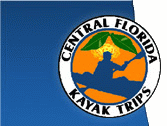
| Chassahowitzka
River and NWR |
 |
| Difficulty: Moderate |
Scenery: Very Good |
Location: Homosassa,
Citrus County |
Distance: 7 miles
round-trip springs loop |
| Atlas: Page 77 C-1 |
| Last Update: May 2003 |
Canoe OK: Yes |
Description
Chassahowitzka, pronounced "Chaz-wits-kuh", consists
of a series of freshwater springs; river and U.S. National Wildlife
Refuge (NWR). Located 60 miles north of Tampa and St. Petersburg
on the gulf coast of Florida, the 31,000+ acre refuge was created
in 1943 as a winter preserve for migratory waterfowl. In addition
to plenty of bird watching opportunities, a keen-eyed canoeist or
kayaker can spot manatee, raccoons, otters, numerous alligators
and possibly even deer, bobcat or a Florida black bear.
The headwaters of the river start approximately 100 feet upstream
from the Chassahowitzka River Campground's boat ramp. A first magnitude
spring and smaller 2nd magnitude springs in the area create the
river which flows 7 miles west to the Gulf of Mexico. The wildlife
refuge starts three miles downstream from the campground. The northern
boundary of the NWR parallels the Homosassa River, with the southern
end 12 miles south at Raccoon Point. Access to the National Wildlife
Refuge is by boat only with the best put-in for paddlers at the
campground.
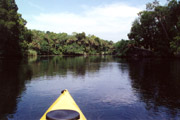
Paddling the Chassahowitzka River. |
Camping is prohibited in the NWR, but is certainly
available and encouraged at the Chassahowitzka River Campground.
The campground features RV and primitive (tent) camp sites,
a general store, showers, restrooms, telephone and a boat launch. |
Access
From Weeki Wachee take US-19 north 13 miles to CR 480 (Miss Maggie
Drive). Go west (left) on 480 for approximately 1.5 miles to Chassahowitzka
River Campground. Follow signs to boat launch. Be sure to ask for
a canoe map when you pay the parking fee.
| Important Items
Boat, Paddle, PFD
Chassahowitzka Parking Fee, $2
Map, Compass
Insect Repellant
[Optional] Canoe rentals available
[Optional] GPS
Environment
National Wildlife Refuge
First and Second Magnitude Springs
Brackish Water (upper)
Lowland Swamps (upper)
Saltwater Bays, Estuary (lower)
Tidal Marshes (lower)
Palm, Ferns, Sawgrass
Many birds and mammals |
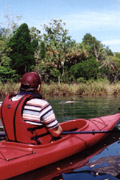
Blue Springs on Baird Creek. |
Tour #1: The Springs Loop (7 miles)
The Springs Loop will take you through seven of the more easily
accessible springs along the Chassahowitzka River. If you make the
trip on a weekday, you'll probably have most of the springs and
river to yourself. On weekends, plan on sharing these wonderful
springs with a few boaters (paddle and motorboat variety). Arrive
early in the day to have a parking space at the campground.
Please note that some of these springs are located in remote, deep
woods areas. You should be comfortable with using a map, compass,
GPS or other navigational tool prior to making the trip.
Chassahowitzka Springs:
To begin, put-in at the campground's boat ramp. Paddle 100 feet
upstream (east). Congratulations, you've made it to the first spring.
The opening to the spring is about 20-30 feet deep in the upper
portion of the basin. Swimming and diving are prohibited due to
motorboat traffic.
Unnamed Springs:
The next set of springs can be found just a few hundred feet to
the east of the main spring. Enter the manmade channel (left as
you are paddling east), and go about 75 feet. The spring run is
between 1 and 2 feet deep in most places, so it's easy to exit your
boat for photos or a quick swim. Water flowing from the springs
is clear and appears to be a radiant blue when viewed in direct
sunlight. By paddling the length of the spring run, you should be
able to spot at least 8 different vents feeding the springs.
Crab Creek Springs:
Starting at Unnamed Springs, head downstream about 200 yards past
the boat ramp. The entrance to Crab Creek is located on the north
side of the river. The spring run is jungle-like and about 100 yards
in length. You'll see two beautiful homes immediately adjacent to
the springs. You can visit the springs, but all surrounding land
is private property. The water is full of particulate matter and
is 6 to 8 feet deep with a light blue color at the three spring
vents.
Blue Springs - Baird Creek:
From Crab Creek Springs, head downstream and paddle along the Chassahowitzka
River for approximately 1/2 mile. Turn south (left) to Baird Creek.
You can identify the entrance by a tiny island, complete with palm
trees, marking the pathway. Baird Creek is a narrow, shallow (1-2
feet deep), twisty, jungle-like waterway enclosed by sawgrass and
trees. If you are terrified of the possibility of running into alligators,
snakes or swarms of mosquitoes you might want to skip Blue Springs
and The Crack. For those brave enough to continue on, slap on generous
amounts of insect repellent and start the 1/2 mile paddle to the
springs. This tiny partially canopied waterway offers some tremendous
photo and wildlife viewing opportunities.
Blue Spring forms a small lagoon, about 100 feet in diameter. The
water is a dark, cloudy blue so it's not possible to see the bottom.
Much of the pool is surrounded by sawgrass and trees, but you can
dock along the backend of the pool for either a quick dip or well-deserved
break.
The Crack - Baird Creek:
The entrance to the Crack can be found at the backend of Blue Springs.
Look for a small opening between two large palm trees. The waterway
here, like much of Baird Creek, is narrow and shallow. Pass the
two small turquoise-colored pools and continue upstream until the
water becomes too shallow to paddle. You'll need to exit your boat
and hike the remaining 200 feet through ankle deep water to the
spring.
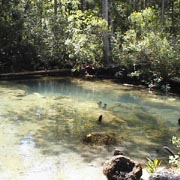
The Crack on Baird Creek |
The Crack is a jagged crevice about 30 feet
long. The clear, oval shaped pool is less than one foot deep
and surrounded by forest. The mosquitoes will keep you from
spending too much time in the area. To return to the Chassahowitzka
River, hike and paddle downstream to Blue Springs. Enter Baird
Creek and paddle 1/2 mile back to the river. |
Salt Springs - Salt Creek:
After returning to the main channel, paddle downstream for 1/3
mile. Here you will encounter a large island that divides the river.
The south (left) fork is used by powerboats. The right fork is shallower
and provides a route much less traveled. Take the right fork and
paddle in a northwest direction for approximately 1/4 mile to the
"T" intersection that signals the entrance to Salt Creek
(to the north/right) and the main channel of the Chassahowitzka
(south/left).
Salt Creek is fed by several streams which look a-like, so it's
easy to get lost in this area. Be sure to carefully chart, or better
yet, use a GPS to map your route. At approximately 1/5 mile from
the entrance, a small creek will run directly north. Stay to the
right to keep on Salt Creek. If you pass a tree growing in an upside
down "U" shape, you're on Salt Creek. The upper branches
of the tree are partially blocking the creek so it's easy to spot.
Salt Creek narrows considerably and heads southeast to a large spring-fed
lagoon. After a rest stop, carefully retrace your route back to
the entrance of Salt Creek. Paddle 200 yards southwest to the main
channel of the Chassahowitzka. Turn downstream to continue to Potter
Creek.
Potter Springs - Potter Creek:
Just west of where Salt Creek meets the river, the Chassahowitzka
widens and becomes shallow. You'll see old posts sticking up from
the river bed. These were once part of a railroad trestle crossing
the river. Another 1/4 mile paddle downstream will bring you to
the entrance of Potter Creek, located on the north side of the river.
Potter Creek runs almost directly north for approximately 3/4 mile
to the springhead. The creek is 30-50 feet wide in most places so
it's easy to navigate. The spring itself is about 100 feet across.
A very shallow creek flows into Potter Spring from the north, with
Ruth Spring as its source. If you are extremely adventurous, you
can paddle and hike 300 feet up the narrow creek to Ruth Spring.
Be careful as this is truly a wild place and you will almost certainly
come across alligators, snakes, spiders and who-knows-what-else.
There is no good place to exit your boat along Potter Creek as the
banks are either overgrown with vegetation or muddy.
Return to Chassahowitzka River Campground:
To return to the campground, go 3/4 mile south along Potter Creek
to the main channel of the river. Turn upstream (east) and paddle
1.5 miles to reach the campground. At 1/3 mile from where Potter
Creek meets the Chassahowitzka, you'll come to the large island
in the middle of the river. Staying right of the island will reduce
your chance of getting lost. Once past the island, it's one mile
to the campground.
Tour #2: Chassahowitzka NWR Entrance (11 miles)
If the seven mile, seven spring tour doesn't do it, you can always
add an extra four miles by heading back down Potter Creek to the
main channel. Turn right (downstream) and go two miles to the Chassahowitzka
National Wildlife Refuge. On the way to the NWR, you'll pass a number
of abandoned boats and summer cottages. All are on private property
so be sure to keep off. Immediately adjacent to the NWR entrance
signage is a private boat dock.
There are very few places to land your canoe or kayak once you
enter the tidal creeks and salt marshes of the refuge so plan on
spending lots of time in your boat. Following the main channel for
another 3.5 miles will take you to Pompano Key in Chassahowitzka
Bay. About a mile before reaching Pompano Key you'll see trail markers
for the Nature Coast Canoe and Kayak Trail leading north to the
Homosassa River.
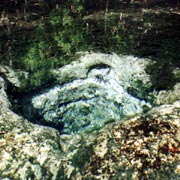
One of several springs that
feed the Chassahowitzka River. |
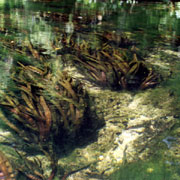
Clear water and eel grass at
Potter Creek. |
Map
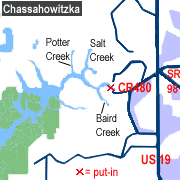
|
GPS Location Aid
Description |
Latitude
Longitude |
Chassahowitzka
River Campground
Boat Launch |
N28.42.892'
W82.34.631' |
Unnamed Springs
No Exit |
N28.42.968'
W82.34.516' |
Crab Creek Springs
Private Dock |
N28.43.026'
W82.34.555' |
Baird Creek Entrance
Sand Bank |
N28.42.875'
W82.35.066' |
Blue Springs
No Exit |
N28.42.545'
W82.34.777' |
The Crack
Shallow-Walk |
N28.42.545'
W82.34.777' |
Railroad Trestle
No Exit |
N28.43.510'
W82.35.926' |
Potter Creek Springs
No Exit |
N28.43.903'
W82.35.793' |
Ruth Springs
No Exit |
N28.43.952'
W82.35.706' |
NWR Border
Private Dock |
N28.42.880'
W82.36.530' |
Pompano Key
Sand |
N28.41.583'
W82.39.010' |
|
|

